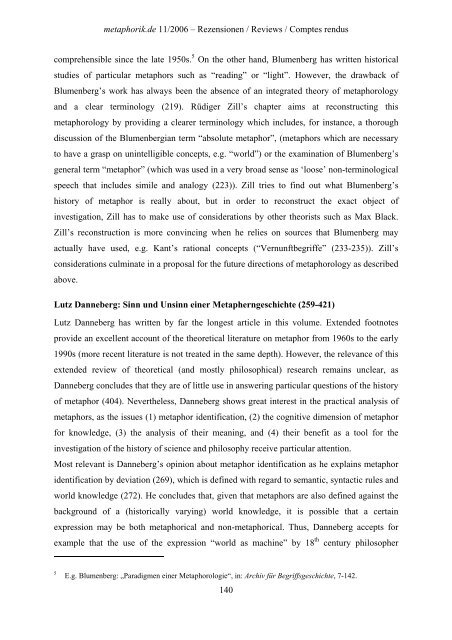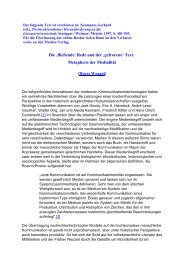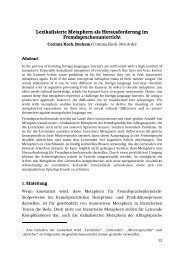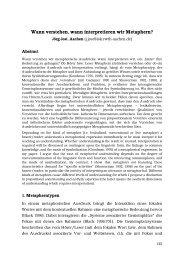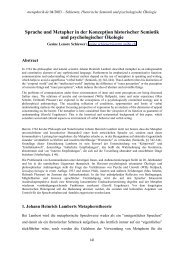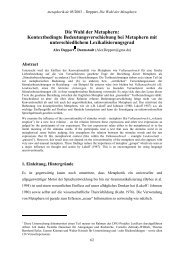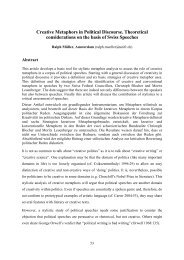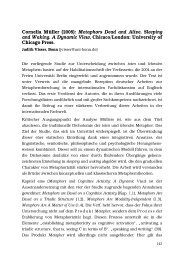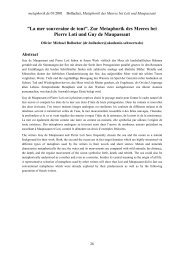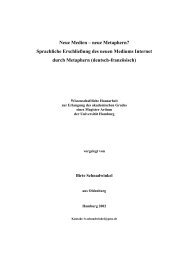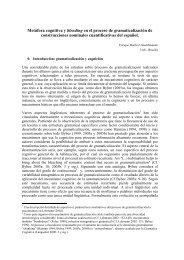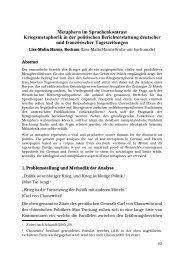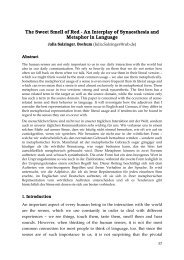Hans Erich Bödeker - metaphorik.de
Hans Erich Bödeker - metaphorik.de
Hans Erich Bödeker - metaphorik.de
Create successful ePaper yourself
Turn your PDF publications into a flip-book with our unique Google optimized e-Paper software.
<strong>metaphorik</strong>.<strong>de</strong> 11/2006 – Rezensionen / Reviews / Comptes rendus<br />
comprehensible since the late 1950s. 5 On the other hand, Blumenberg has written historical<br />
studies of particular metaphors such as “reading” or “light”. However, the drawback of<br />
Blumenberg’s work has always been the absence of an integrated theory of metaphorology<br />
and a clear terminology (219). Rüdiger Zill’s chapter aims at reconstructing this<br />
metaphorology by providing a clearer terminology which inclu<strong>de</strong>s, for instance, a thorough<br />
discussion of the Blumenbergian term “absolute metaphor”, (metaphors which are necessary<br />
to have a grasp on unintelligible concepts, e.g. “world”) or the examination of Blumenberg’s<br />
general term “metaphor” (which was used in a very broad sense as ‘loose’ non-terminological<br />
speech that inclu<strong>de</strong>s simile and analogy (223)). Zill tries to find out what Blumenberg’s<br />
history of metaphor is really about, but in or<strong>de</strong>r to reconstruct the exact object of<br />
investigation, Zill has to make use of consi<strong>de</strong>rations by other theorists such as Max Black.<br />
Zill’s reconstruction is more convincing when he relies on sources that Blumenberg may<br />
actually have used, e.g. Kant’s rational concepts (“Vernunftbegriffe” (233-235)). Zill’s<br />
consi<strong>de</strong>rations culminate in a proposal for the future directions of metaphorology as <strong>de</strong>scribed<br />
above.<br />
Lutz Danneberg: Sinn und Unsinn einer Metapherngeschichte (259-421)<br />
Lutz Danneberg has written by far the longest article in this volume. Exten<strong>de</strong>d footnotes<br />
provi<strong>de</strong> an excellent account of the theoretical literature on metaphor from 1960s to the early<br />
1990s (more recent literature is not treated in the same <strong>de</strong>pth). However, the relevance of this<br />
exten<strong>de</strong>d review of theoretical (and mostly philosophical) research remains unclear, as<br />
Danneberg conclu<strong>de</strong>s that they are of little use in answering particular questions of the history<br />
of metaphor (404). Nevertheless, Danneberg shows great interest in the practical analysis of<br />
metaphors, as the issues (1) metaphor i<strong>de</strong>ntification, (2) the cognitive dimension of metaphor<br />
for knowledge, (3) the analysis of their meaning, and (4) their benefit as a tool for the<br />
investigation of the history of science and philosophy receive particular attention.<br />
Most relevant is Danneberg’s opinion about metaphor i<strong>de</strong>ntification as he explains metaphor<br />
i<strong>de</strong>ntification by <strong>de</strong>viation (269), which is <strong>de</strong>fined with regard to semantic, syntactic rules and<br />
world knowledge (272). He conclu<strong>de</strong>s that, given that metaphors are also <strong>de</strong>fined against the<br />
background of a (historically varying) world knowledge, it is possible that a certain<br />
expression may be both metaphorical and non-metaphorical. Thus, Danneberg accepts for<br />
example that the use of the expression “world as machine” by 18 th century philosopher<br />
5 E.g. Blumenberg: „Paradigmen einer Metaphorologie“, in: Archiv für Begriffsgeschichte, 7-142.<br />
140


